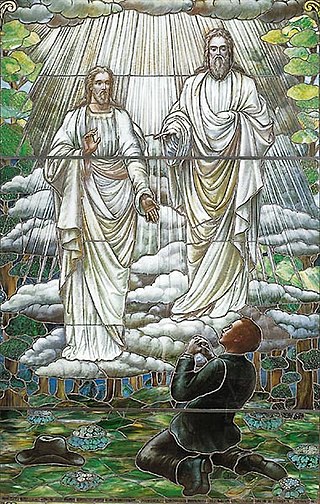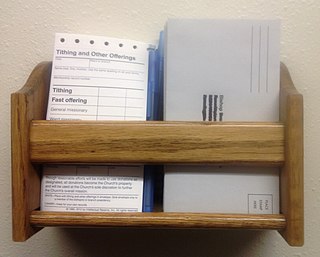Related Research Articles

The Church of Jesus Christ of Latter-day Saints, informally known as the LDS Church or Mormon Church, is a restorationist, nontrinitarian Christian denomination that is the largest denomination in the Latter Day Saint movement. The church is headquartered in the United States in Salt Lake City, Utah and has established congregations and built temples worldwide. According to the church, it has over 17 million members and over 72,000 full-time volunteer missionaries. The church was the fourth-largest Christian denomination in the United States as of 2012, and reported over 6.8 million US members as of 2022.

A tithe is a one-tenth part of something, paid as a contribution to a religious organization or compulsory tax to government. Today, tithes are normally voluntary and paid in cash or cheques or more recently via online giving, whereas historically tithes were required and paid in kind, such as agricultural produce. After the separation of church and state, church tax linked to the tax system are instead used in many countries to support their national church. Donations to the church beyond what is owed in the tithe, or by those attending a congregation who are not members or adherents, are known as offerings, and often are designated for specific purposes such as a building program, debt retirement, or mission work.
In the Latter Day Saint movement, priesthood is the power and authority of God given to man, including the authority to perform ordinances and to act as a leader in the church. A group of priesthood holders is referred to as a quorum.

The Aaronic priesthood is the lesser of the two orders of priesthood recognized in the Latter Day Saint movement. The others are the Melchizedek priesthood and the rarely recognized Patriarchal priesthood. Unlike the Melchizedek priesthood, which is modeled after the authority of Jesus and the Twelve Apostles, or the Patriarchal priesthood, which is modeled after the authority of Abraham, the Aaronic priesthood is modeled after the priesthood of Aaron the Levite, the first high priest of the Hebrews, and his descendants. The Aaronic priesthood is thought to be a lesser or preparatory priesthood and an "appendage" of the more powerful Melchizedek priesthood.
The Church of Jesus Christ of Latter-day Saints has several unique teachings about Judaism and the House of Israel. The largest denomination in the Latter Day Saint movement, the LDS Church, teaches the belief that the Jewish people are God's chosen people and it also teaches the belief that its members share a common and literal Israelite ancestry with the Jewish people.

Sacrament meeting is the primary weekly Sunday worship service in the Church of Jesus Christ of Latter-day Saints.
In the Latter Day Saint movement, a bishop is the highest office of the Aaronic priesthood. It is almost always held by one who holds the office of high priest in the Melchizedek priesthood. The Latter Day Saint concept of the office differs significantly from the role of bishops in other Christian denominations, being in some respects more analogous to a pastor or parish priest. Each bishop serves with two counselors, who together form a bishopric.
Fast Sunday is a Sunday set aside by the Church of Jesus Christ of Latter-day Saints for fasting by its members. On Fast Sunday, a fast and testimony meeting is held by local congregations of the Church of Jesus Christ of Latter-day Saints.

Latter-day Saint Charities is a branch of the welfare department of the Church of Jesus Christ of Latter-day Saints. The organization's stated mission is to relieve suffering, to foster self-reliance for people of all nationalities and religions, and to provide opportunities for service.
The law of consecration is a commandment in the Latter Day Saint movement in which adherents promise to dedicate their lives and material substance to the church. It was first referred to in 1831 by Joseph Smith.
A presiding bishop is an ecclesiastical position in some denominations of Christianity.
Elder is a priesthood office in the Melchizedek priesthood of denominations within the Latter Day Saint movement, including The Church of Jesus Christ of Latter-day Saints.
In the Church of Jesus Christ of Latter-day Saints, a church membership council is an ecclesiastical event during which a church member's status is considered, typically for alleged violations of church standards. If a church member is found to have committed an offense by a membership council, they may have their name removed from church records, or their church membership may be otherwise restricted. Church membership councils are at times referred to unofficially as church courts.

The finances of the Church of Jesus Christ of Latter-day Saints (Church) are not a matter of public record. In the absence of official statements, people interested in knowing the Church's financial status and behavior, including both members of the Church and others, have attempted to estimate or guess. According to the Church, their funding comes from the donations of its members and the principal expense is in constructing and maintaining facilities.
The Presiding Bishop of the Church of Jesus Christ of Latter-day Saints is a priesthood calling with church-wide authority. The Presiding Bishop is the highest leadership position within the church's Aaronic priesthood, although most of the work in this area is delegated to the church's Young Men general presidency.
The General Handbook: Serving in The Church of Jesus Christ of Latter-day Saints is an on-line book of instructions and policies for leaders and members of the Church of Jesus Christ of Latter-day Saints. The contents are prepared by the church's First Presidency and Quorum of the Twelve Apostles. Along with the church's standard works, the General Handbook stands as the preeminent policy and practice guide for the leaders of the LDS Church.

A bishop's storehouse in the Church of Jesus Christ of Latter-day Saints usually refers to a commodity resource center that is used by bishops of the church to provide goods to needy individuals. The storehouses stock basic foods and essential household items. The term can also be used figuratively to refer to all of the time, talents, skills, materials, compassion, and financial means of the members of the church that are available to be applied in the service of the needy.

The Church of Jesus Christ of Latter-day Saints focuses its doctrine and teaching on Jesus Christ; that he was the Son of God, born of Mary, lived a perfect life, performed miracles, bled from every pore in the Garden of Gethsemane, died on the cross, rose on the third day, appeared again to his disciples, and now resides, authoritatively, on the right hand side of God. In brief, some beliefs are in common with Catholics, Orthodox and Protestant traditions. However, teachings of the LDS Church differ significantly in other ways and encompass a broad set of doctrines, so that the above-mentioned denominations usually place the LDS Church outside the bounds of orthodox Christian teaching as summarized in the Nicene Creed.

Tithing is a commandment accepted by various churches in the Latter Day Saint movement. In practicing tithing, adherents make willing tithe donations, usually ten percent of their income, to their church. It is based on both the biblical practice of paying tithes and modern revelation given to Joseph Smith and his accepted successors. For many of these churches, the law of tithing replaced or supplemented the law of consecration. The Church of Jesus Christ of Latter-day Saints emphasized tithing in the 1900s and 1960s to assist in paying church debts.

Philanthropies, formerly LDS Philanthropies, is a department of the Church of Jesus Christ of Latter-day Saints and is responsible for facilitating donations to humanitarian and educational initiatives. The department works under the direction of the church's Presiding Bishop. The most widely known educational projects are the operation of church-owned schools, such as Brigham Young University (BYU). Humanitarian funds are given to Latter-day Saint Charities which sponsors and organizes relief efforts. In 2019, the church reported over 3,000 community-based projects with an excess of 2,000 partners, in locations around the world. A 2020 statistic reported a total of $2.3 billion that had been donated over Philanthropies' existence.
References
- 1 2 "Fasting and Fast Offerings", churchofjesuschrist.org.
- ↑ Church Welfare Resources Archived 2010-11-28 at the Wayback Machine .
- ↑ LDS Church, Aaronic Priesthood Manual I, Lesson 4: "The Law of the Fast".
- ↑ THE CHURCH OF JESUS CHRIST OF LATTER-DAY SAINTS (GREAT BRITAIN), provided by the Charity Commission based on the Charities Act
- ↑ Charities Listings. Cra-arc.gc.ca (2008-11-10). Retrieved on 2011-01-04.
- ↑ "Fast Offerings", Encyclopedia of Mormonism .
- ↑ LDS Church, Handbook 1: Stake Presidents and Bishops (Salt Lake City, Utah: LDS Church, 2010) §5.2.3.
- ↑ "Questions about Coping Financially: Welfare Services Suggests Some Answers", Ensign June 1980, p. 12.